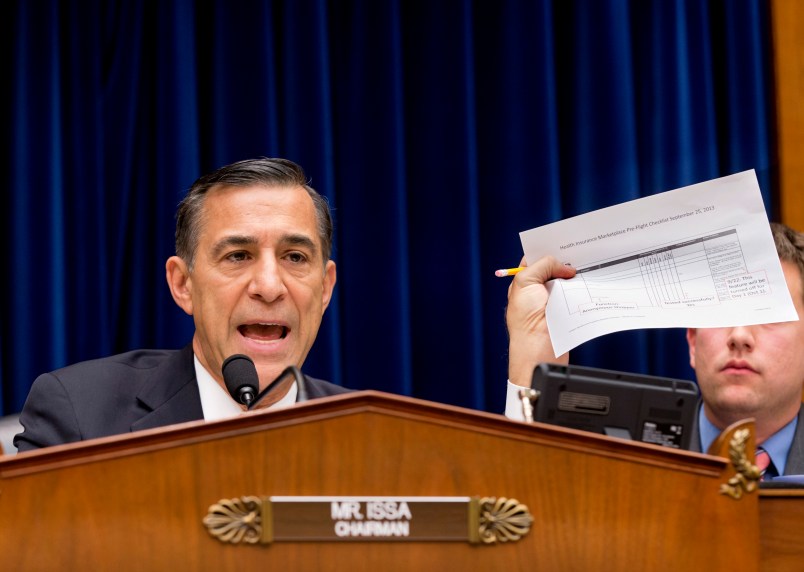When the budget deal cleared the House last week, some might have mistakenly believed that the GOP’s fever over Obamacare had at least slightly subsided. Implicit in its passage was a pledge that Republicans would not shut down the government — again — over the health care reform law.
And they (probably) won’t. But that doesn’t mean Congress has arrived at a kumbayah moment after which both sides will work to refine the law with fixes that might appeal to both sides.
No, the Republican repeal crusade isn’t over. It’s just taken another form.
“Legislating is certainly possible, but we don’t believe the law can be truly ‘fixed’ — only scrapped entirely,” Brendan Buck, the top spokesman for House Speaker John Boehner (R-OH) told TPM. “Our focus will be on building the case for repeal through proper oversight.”
That’s bad news for anybody with an interest in fine-tuning parts of the law that they don’t like. First among those is the insurance industry, which has set its sights on the health insurance provider annual fee. It’s a fee — they called it a tax — on insurance carriers, which starts at the beginning of 2014 and is expected to bring in $100 billion over 10 years. Insurers have warned that the resulting costs would be passed onto consumers.
They’ve already got a two-year delay introduced in Congress. The bipartisan bill, co-sponsored by Reps. Charlie Boustany (R-LA) and Ami Bera (D-CA), did not include any means for making up for that lost revenue (at least $8 billion for 2014). The coalition behind the push, which includes groups like America’s Health Insurance Plans and the U.S. Chamber of Commerce, touted it as the first step toward full elimination of the tax.
But House Republicans don’t appear enthusiastic about moving the bill. It’s been languishing in the Ways and Means Committee since the end of October when it was introduced, and committee staff didn’t return TPM’s requests for comment. As Buck’s comments suggests, Republicans are more interested in highlighting the flaws in Obamacare’s implementation than any serious legislating that would change it — even something as politically appetizing as a tax delay.
Instead, their energy is being funneled into oversight. House Republicans have called Health and Human Services Secretary Kathleen Sebelius to testify before them twice since Obamacare launched Oct 1., and her underlings have been summoned numerous other times to explain the disastrous rollout of HealthCare.gov, the site’s security risks and other parts of the law they find unacceptable like narrow provider networks or fraud and waste.
House Oversight Chairman Darrel Issa (R-CA) has convened eight hearings himself since Oct. 1, including so-called field hearings in Texas, Georgia and Arizona. He’s subpoenaed Sebelius for HealthCare.gov documents and asked insurance companies to turn over information related to President Obama’s “if you like your health plan, you can keep it” promise.
As Issa ends most of his inquisitions: “The Committee on Oversight and Government Reform is the principal oversight committee of the House of Representatives and may at ‘any time’ investigate ‘any matter’ as set forth in House Rule X.”
That’s an authority that he seems intent, with his leadership’s blessing, to exercise to its fullest.






